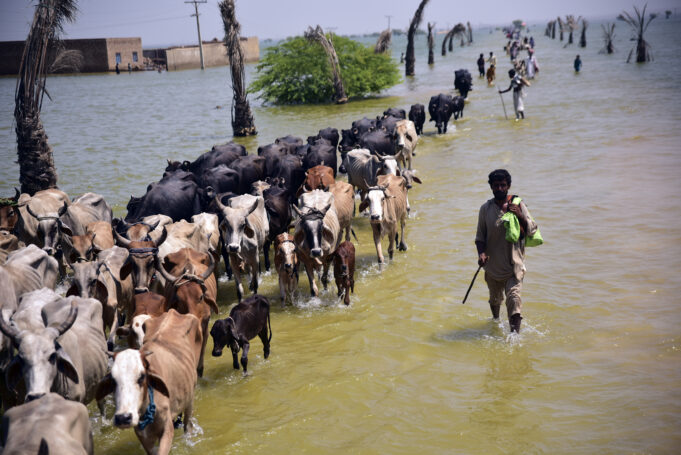Authorities in Pakistan say skin infections, diarrhea and malaria in the flood-ravaged regions have claimed the lives of 324 people.
They said on September 21 that the situation may get out of control if the required aid does not arrive in time.
Hundreds of thousands of Pakistani people displaced by the torrential rains and flooding are living in the open and stagnant waters have led to serious health issues nationwide.
The authorities called for the acceleration of aid delivery.
Pakistan’s health system already faces a host of shortcomings. The displaced families complain about being forced to drink and cook with disease-ridden water.
“The aid is slow to arrive,” said Farah Naureen, Mercy Corps’ country director for Pakistan after visiting several submerged regions.
“We need to work in a coordinated manner to respond to their immediate needs,” Naureen said, adding that health and nutrition stand out as the most crucial needs of the displaced after clean drinking water.
The southern Sindh provincial government announced on September 21 that makeshift health facilities and mobile camps in the flooded areas had treated more than 78,000 patients in the past 24 hours, and more than two million since the monsoon flooding started in July.
The provincial government said six people had also lost their lives over the past day.
The country’s disaster management agency says well over 1,500 people have been killed in the flash floods, including 555 children and 320 women.
Over the past few weeks, authorities have thrown up barriers to keep the flood waters out of key structures such as power stations as well as homes. Farmers who stayed to try and save their cattle faced a new threat as fodder began to run out.
The deluge has affected nearly 33 million people in the South Asian nation of 220 million, sweeping away homes, crops, bridges, roads and livestock in damages estimated at about $30 billion, with the government and the United Nations blaming climate change for the surging waters. (Presstv.ir)
Australian Indigenous traditional owners halt gas drilling
CANBERRA, Australia—Indigenous traditional owners on September 21 won a court challenge that prevents an energy company from drilling for gas off Australia’s north coast.
The Federal Court decision against Australian oil and gas company Santos Ltd. was a major win for Indigenous rights in the nation.
Dennis Murphy Tipakalippa, who was described in court documents as an elder, senior lawman and traditional owner of the Munupi clan on the Tiwi Islands, had challenged the regulator’s approval of Santos’ $3.6 billion plan to drill the Barossa Field beneath the Timor Sea.
Justice Mordy Bromberg quashed the February decision by the regulator, the National Offshore Petroleum Safety and Environmental Management Authority, to allow the drilling.
The judge found the regulator should not have been satisfied that the project’s drilling plan met legal criteria.
Tipakalippa had argued that the regulator could not be “reasonably satisfied,” as required by law, that Santos had carried out necessary consultations about its drilling plans.
Santos had not consulted with his clan, Tipakalippa said, and he feared the project would harm the ocean environment.
Santos foreshadowed an appeal before three Federal Court judges.
“Given the significance of this decision to us, our international joint venture partners and customers, and the industry more broadly, we consider that it should be reviewed by the Full Federal Court on appeal,” the company said in a statement.
Santos described the ruling as a “disappointing outcome,” and said the company had engaged with Indigenous organizations on the Tiwi Islands and the Australian mainland about the proposed drilling.
Drilling has been suspended pending a successful appeal or a renewed application for the regulator’s approval, Santos said.
The Barossa Field is 165 miles north of the gas-hub city of Darwin on the Australian mainland and 86 miles north of the Tiwi Islands.
The plan is to pipe the gas past the islands to Darwin.
Munupi is one of eight Tiwi Islands clans and its traditional land is closest to the gas field.
Tipakalippa claims that he and other Tiwi Islanders hold “sea country” rights including and beyond the Barossa Field.
Santos, Australia’s second-largest independent gas producer, has already begun drilling the field.
Bromberg went to the Tiwi Islands last month and took evidence about the Munupi people’s connection to the land and sea from several witnesses in words, song and dance. (AP)
Thousands rally in Belgium to protest high energy prices
BRUSSELS—Thousands of people gathered on September 21 in the Belgian capital Brussels for “a national day of action” to protest against skyrocketing electricity, natural gas and food prices and draw attention to the sharp hike in the cost of living.
Trade unions and city police said that around 10,000 took part. People from across the country gathered, marching behind banners reading “Life is much too expensive, we want solutions now,” and “Everything is going up except our wages,” or carrying placards marked “Freeze prices, not people.” City traffic and public transportation was disrupted.
A Belgian media poll recently showed that 64 percent of people questioned, are concerned that they might not be able to afford their electricity and gas bills, which have more than doubled over the last year, while 80 percent of respondents said they are already trying to make energy and water savings.
“When we go grocery shopping, what’s in the cart costs now 20, 30 euros (dollars) more, or even more depending on the shop you go to. We are reaching a point where our wallets can’t keep up,” said Pascal Kraeso, a protester from Brussels.
In August, Prime Minister Alexander de Croo warned that “the next five to 10 winters will be difficult” because of high electricity and natural gas prices fueled by Russia’s war in Ukraine.
The European Union’s 27 member countries have agreed to cut gas usage by 15 percent on average this winter and aim in particular to reduce demand during peak hours. EU energy ministers are meeting next week to discuss the crisis. (AP)













